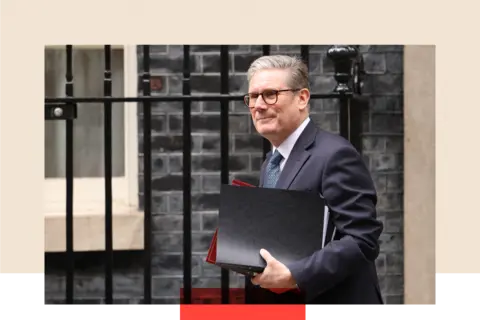“It’s not at all how I imagined winning would be,” a minister reflects as the government hits its 100 days in office.
There have been slips and accusations of sleaze. Scores of announcements. Enormous international events.
The PM himself admits it’s been “choppy”. Even in the last 24 hours the government has blundered into a row with a big investor after a minister urged consumers to boycott them.
It was the US President Franklin D Roosevelt who came up with the entirely arbitrary concept of 100 days - those magical first few months when a leader has the chance to wow the public.
In FDR’s case, it was after America’s Great Depression.
Labour argues as loudly as it can that their inheritance was pretty dreadful too - and his first few months have had their fair share of disappointments.
There’s been a Downing Street staffers’ soap opera. A slump in the polls. Ructions in the party about a plan to take cash away from millions of pensioners. That’s the stuff of Labour nightmares.
Yet we've also seen ideas that are stuff of the party's dreams. There are sweeping new rights at work. New laws to help get houses built. The railways coming back into public hands.
It's been a topsy-turvy start - but what kind of government is this really turning out to be?
In the last few days I’ve been spoken to more than twenty different sources – cabinet ministers, MPs, officials and party insiders, about what has gone right and what has gone wrong as the government comes of age.
 Getty Images
Getty ImagesWhat’s gone right?
Let’s start with what Sir Keir Starmer and his hundreds of MPs might be posting on their social media, sticking on leaflets, or boasting about in interviews.
The government has, as promised, gone ahead with many of the plans it committed to in the Labour manifesto – whether that is shaking up the planning rules, going ahead with nationalising the railways, giving workers many more rights at work, creating GB Energy or getting rid of one-word Ofsted judgements in England.
Like them or not, these are chunky measures designed to make big changes to the country. “Our agenda is massive,” one minister says, “and I feel really optimistic.”
A senior figure in the party warns colleagues that “things are absolutely recoverable” - reminding others that plenty of things went wrong in 1997 for Tony Blair’s new government, and they won big again in 2001, then again in 2005.
At home, many point to the prime minister’s handling of the summer riots. “He is a serious man, he is made for it,” says one cabinet minister, adding he was “absolutely comfortable and resolute…he knew what to do, and gripped it completely”.
Another insider wonders: “imagine how wrong that could have gone,” if the government’s approach had been different on the riots.
There are visibly better relationships between Westminster, Holyrood, Cardiff and Stormont, with the new Council of the Nations and Regions.
Attention has been lavished on the English mayors too, not just in the grip and grin of photocalls, but being plumbed in to policies at an earlier stage of the planning.
Internationally, Sir Keir Starmer appears to have made good connections, grappling with multiple foreign crises.
One observer says on the world stage he has a “big advantage which is political stability and strength”, describing the PM as “careful and confident” in those kinds of head to heads.
Some nerves have been calmed by the No 10 reboot – with the exit of Sue Gray, given a P45 from her big job as chief of staff, Sir Keir has “shown he can be ruthless”, says an MP.
In other words, multiple sources have suggested that as they hit 100 days in office Labour needs to take a breath remember it won, and won big.
They’re telling themselves that a new government doesn’t have to be defined by a scrappy first few months, when the clamour around a few political mistakes crowded out the attention being paid to big reforms that had been planned for.
"The good thing is you are actually playing on the pitch, even if you still have to get fit," says another MP.
A cabinet minister says: “It’s just so good to be in government; it’s really, really tough but any tough day is better than 14 years of carping on in opposition.”
What’s gone wrong?
Some things, however, have gone badly wrong - which has stopped winning from feeling like what many Labour figures might have imagined.
And there are worries inside Downing Street about what will happen in the Budget in the coming weeks.
“Our stories have been winter fuel and freebies,” says one insider, suggesting the two issues that have really hit home with the public have both been avoidable and damaging.
This weekend, there is another avoidable row with a big business that was due to be writing a big cheque, very publicly, this week.
There were suggestions that P&O Ferries would pull out of the government’s big investment summit this week after Transport Secretary Louise Haigh said she’d been boycotting the company and urged consumers to do the same.
Now it appears they will go to the summit after all.
And the saga over Sue Gray still hasn’t necessarily come to an end.
The issue of her severance pay and what’s understood as her ambition for the House of Lords are still hanging around.
The issue here isn’t really about the anatomy of those individual screw-ups - it’s what it tells us about how the new government operates.
Are they minor missteps of people limbering up for greatness as they get used to the job?
Or has the experience of the first 100 days exposed more serious flaws? Talking to sources across the party there are wildly different answers to this.
Just teething problems?
It’s not surprising government gets a bit of getting used to. The transition is a bonkers process.
“We went from being an absolute machine, everything centred on HQ, everyone together, then suddenly you’re across the river,” one senior source said.
Ministers and staffers are split up and spread out across government.
They suddenly have hordes of civil servants at their disposal. If you’re in the mood to cut them some slack, it is a lot to get used to.
But I remember one minister telling me they were better prepared than any other government in history. There were plenty of policy proposals ready to go. That is not the same has having an overarching political plan.
One source told me it was “abundantly clear there was an election plan but there was no plan for government – you can’t just have a list” of policy.
And a minister suggests there was an early rush - “everyone tripped over themselves to announce things” in the first couple of weeks but then left a vacuum in the summer.
Then staff tensions in No 10 led to “well-documented dysfunction that was debilitating and depleted attention, resolve and resilience”, they add.
 PA
PAThe neat explanation for Sir Keir’s backers is that Sue Gray was the wrong appointment for the chief of staff job in Downing Street.
One official said: “the civil service can do all the Whitehall bit, but the politics are on fire.”
In the system she set up no-one was paying enough attention to making the political arguments, this analysis goes.
Now Gray has moved on, No 10 is under the charge of Sir Keir’s long-time political supremo who ran the election campaign, Morgan McSweeney.
You can hear the sigh of relief around Whitehall.
“He’s the right person to lead No 10, he has amazing politics and most importantly Keir trusts him,” a minister close to Sir Keir says, hoping the government will pass its teething problems onwards to glory.
Allies of the PM also tell me there’ll be a shift in how he behaves, giving more political direction and sticking his nose more quickly into what his ministers are up to at home.
After the first 100 days he’s said to have a “better understanding of what the team wants from the captain”.
However, others across the party believe a No 10 shake-up isn’t a magic fix, identifying bigger problems afoot.
One party figure suggests some ministers, even senior figures like the Chancellor Rachel Reeves, haven’t found their mojo yet.
There is a “look in the eyes, still looking for approval”, they suggest, rather than projecting “I’m the person who knows what I’m doing”.
“Part of the reason for them misfiring is the lack of personal confidence,” they add.
Another source jokes, “they (Tories) have a sense of entitlement that matches our imposter syndrome”.
But others push back at that description, saying “she’s the one grabbing the Treasury to stop it just counting beans and start pushing growth.”
Multiple sources whisper the word “naive” when it comes to the Starmer operation – naive about the level of scrutiny they’d face in office, naive about how personal donations would be seen by the public, and naive about how quickly they would be judged.
One MP says, “a bit like Sunak, he thought if he could demonstrate how hard he was working that would be enough.”
Another source says they are “astonished - what has surprised me is the naivety - why wouldn’t they think we are going to be under huge scrutiny?”
When it comes to Sir Keir himself, for years even allies have accepted he is not steeped in politics – he came to its bizarre and intense daily routines after a different career.
When it comes to donations for example, one party figure says, “he just won’t have seen it, he is not political in his gut.”
A long-time adviser identifies a tendency in the new government to be a bit surprised, or uncomfortable at being challenged in the unrelenting way they have been since moving into No 10, because there’s a belief that “we are right-thinking people”.
Part of politics is being able to look yourself in the mirror and see what others see too.
Time on his side?
Having covered lots of different administrations, I’ve found the make-up of the team to be crucial - but moving things around is rarely a cure of all ills.
And in some corners of government there is a different worry that the new government has not quite yet decided what it wants to be and that the problems are deeper than early wobbles.
The Tories in government gave Labour endless material through years of scandal and scrapes.
But now, the “baddies aren’t gifting us things every day”, says one source, Labour in office is instead responsible for writing its own script.
Even among some cabinet ministers there’s a call for a more defined message about what the government is for: “We were always not Corbyn, then not the Tories and now what?”
The government’s answer to that sense of purpose is their much vaunted “missions”, which are designed to define what Labour is trying to achieve.
But one official says: “the mission things are massive sprawling things and that bit of the operation in the middle is just weird.”
 Getty Images
Getty ImagesAnd yet there is nothing new in criticism of Sir Keir that it’s never quite clear what he really wants to do or believes in.
It’s been around even since he ran to become the Labour leader four years ago, when he said he stood for “moral socialism”, and lots of people scratched their heads.
But it hasn’t stopped him. He pulled off the political feat of winning the election - which seemed impossible when becoming party leader.
This first period has without question been rougher than Labour would have expected.
There are reasons the party has to be worried about what has gone wrong.
But another minister says “a CEO would never be judged by their first 100 days.”
It’s only around a twentieth of the time at Labour’s disposal before they have to call the next election.
Labour has an enormous majority, a political opposition that is in a mess, and time on its side.
One minister told me: “Starmer was underestimated when he was first leader, he was underestimated then, and he is being underestimated now – he’ll surprise people.”
The surprises of the first 100 days have been nasty ones. He’ll hope happier ones lie ahead.

Top photo credit: Getty Images
BBC InDepth is the new home on the website and app for the best analysis and expertise from our top journalists. Under a distinctive new brand, we’ll bring you fresh perspectives that challenge assumptions, and deep reporting on the biggest issues to help you make sense of a complex world. And we’ll be showcasing thought-provoking content from across BBC Sounds and iPlayer too. We’re starting small but thinking big, and we want to know what you think - you can send us your feedback by clicking on the button below.

.jfif)
Post a Comment